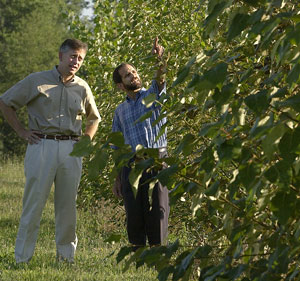 A tree that can reach 90 feet in six years and be grown as a row crop on fallow farmland could provide an additional feedstock for biofuels production.
A tree that can reach 90 feet in six years and be grown as a row crop on fallow farmland could provide an additional feedstock for biofuels production.
According to a Purdue University release, researchers Clint Chapple and Rick Meilan (pictured with trees) are using genetic tools in an effort to design trees that readily and inexpensively can yield the substances needed to produce alternative transportation fuel. The scientists are focused on a compound in cell walls called lignin that contributes to plants’ structural strength, but which hinders extraction of cellulose. Cellulose is the sugar-containing component needed to make the alternative fuel ethanol.
Chapple and Meilan want to genetically modify a hybrid poplar tree so that lignin will not impede the release of cellulose for degradation into fermentable sugars, which then can be converted to ethanol. The changed lignin also may be useable either in fuel or other products, they said.

